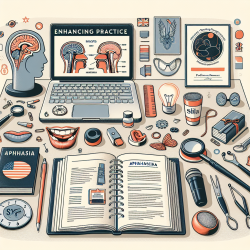As professionals in the field of speech-language pathology, we continuously seek innovative and effective ways to enhance our practice, especially when it comes to providing therapy for complex communication disorders such as aphasia. The "Aphasia Manuals Index" (AMI) is a resource that promises to streamline the process of selecting appropriate therapy exercises for individuals with aphasia, thereby improving the efficiency and effectiveness of therapeutic interventions. This blog post explores how practitioners can leverage the outcomes of the research presented in the AMI to improve their skills or encourage further research.
The AMI is designed to assist speech-language pathologists in identifying and selecting suitable therapy exercises from a selection of 26 widely used books for adult language and cognitive retraining. It provides a comprehensive overview of available exercises, detailing the stimulus and response modalities, the approximate stimulus and response length, the type of response required from the patient, and the type of task. This level of detail allows therapists to tailor their therapy sessions to the specific needs of their clients with aphasia, ensuring that each session is as effective as possible.
One of the key benefits of the AMI is its potential to save valuable clinical preparation time. By having a centralized index of therapy exercises, therapists can quickly locate exercises that meet specific criteria, which might otherwise be overlooked. This efficiency in planning allows for more time to be spent on direct patient care, ultimately benefiting the individuals receiving therapy.
The AMI is available in both printed and computer-based versions, making it accessible and user-friendly for all practitioners, regardless of their preference for digital or physical resources. The computerized version, in particular, offers the convenience of searching the database by category, response type, or book, or by any combination of the three. This flexibility ensures that therapists can easily find exercises that align with their therapeutic goals.
In addition to improving individual therapy sessions, the AMI also has the potential to enhance collaborative efforts among speech-language pathologists. By sharing insights and recommendations from the index, therapists can learn from each other's experiences and discover new approaches to aphasia therapy. This collaborative spirit fosters a community of learning and professional development, which is essential for advancing the field.
Furthermore, the AMI encourages practitioners to engage in further research by highlighting the vast array of therapy exercises available for aphasia. By exploring the index, therapists may identify gaps in the literature or recognize areas where new research could contribute to the development of more effective therapy techniques. This curiosity-driven approach to professional development not only benefits the individual practitioner but also contributes to the collective knowledge base of the speech-language pathology community.
Implementing the outcomes of the research presented in the AMI into practice involves a few key steps. First, therapists should familiarize themselves with the index and explore the range of exercises available. This exploration can include reviewing exercises from books that are not currently in their personal library, thereby expanding their repertoire of therapy resources. Second, therapists should consider the specific needs of their clients with aphasia and select exercises that align with their therapeutic goals. Finally, practitioners should be open to experimenting with new exercises and techniques, monitoring their effectiveness, and adjusting their approach as needed.
The AMI is not just a tool for selecting therapy exercises; it is a catalyst for professional growth and development. By utilizing this resource, speech-language pathologists can enhance their practice, improve client outcomes, and contribute to the advancement of aphasia therapy. As we continue to navigate the complexities of communication disorders, resources like the AMI play a crucial role in supporting our efforts to provide the best possible care for individuals with aphasia.
In conclusion, the Aphasia Manuals Index is an invaluable resource for speech-language pathologists seeking to enhance their practice and deliver more effective aphasia therapy. By leveraging the comprehensive information provided by the AMI, therapists can save time in therapy planning, tailor their interventions to the specific needs of their clients, and engage in collaborative learning and research. As we strive to improve the lives of individuals with aphasia, the AMI serves as a testament to the importance of resources that support professional development and evidence-based practice.
To read the original research paper, please follow this link: Aphasia Manuals Index.










